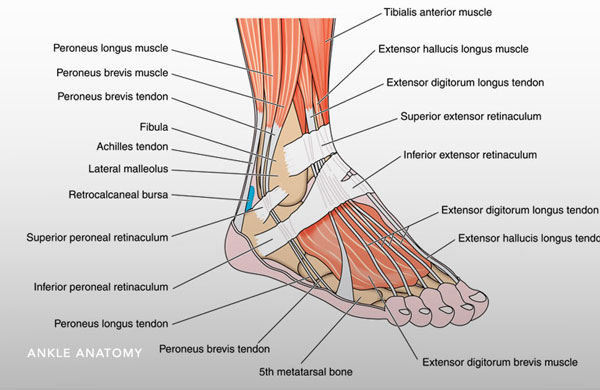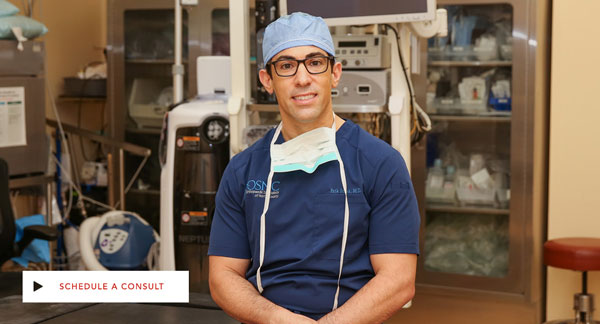The Achilles tendon is the strongest, thickest and largest tendon in the body. It attaches the calf muscles to the heel bone, and is critical for walking, climbing, jumping and running. The Achilles tendon’s function is to bend the foot downward at the ankle. A rupture of the Achilles tendon is a debilitating injury that requires a long, and sometimes incomplete recovery. Middle-aged men suffer a torn Achilles tendon more often than women, and the rates increase with age.

What is an Achilles tendon rupture?
A rupture is when the tendon tears, either partially or completely.
What are the symptoms?
- A sudden sharp pain in the heel
- A snapping sound when the tendon breaks
- Difficulty walking, and inability to bear weight
- An inability to walk on tiptoes
What causes an Achilles tendon rupture?
The majority of Achilles tendon ruptures are the result of traumatic sports injuries in middle aged, healthy, active men. A sudden strong force on the foot or ankle as found in football, running, basketball, diving and tennis can rupture this tendon. Weekend warriors frequently experience a rupture. Any sport that requires the foot to push off causing the calf muscles to contract can stress the tendon.
Other causes include a fall that forces the foot into an upward pointing position, or a deep cut to the back of the ankle. Importantly, a rupture can result in older men who have chronic degeneration of the tendon and repetitive stress, without a physical blow.
Potential predisposing factors that increase the risk of rupture include:
- Corticosteroid medications
- Corticosteroid injections near the ankle
- Certain medical conditions like Rheumatoid Arthrits, Gout, and some rare diseases
- Some antibiotics
- Long-standing tendinitis or tendinosis. Tendinosis is when the tendon degenerates, swells and inflames. Tendinitis is inflammation that irritates the tendon, that results from repetitive stress, overuse and age-related degeneration of the tendon.
- Obesity
How is it diagnosed?
Achilles tendon ruptures can be detected with physical exam. Often the injury is visible but can’t be felt. Dr. Stark will conduct a physical exam and use specific clinical tests to identify a rupture. However, studies report that up to 20% of ruptures can be missed with clinical assessment. Thus, Dr. Stark will order diagnostic imaging tests to confirm a suspected rupture, including an MRI which is the gold standard for diagnosis of Achilles tendon rupture with 100% accuracy.

How is it treated?
Treatment options will depend on the diagnosis, your age, activity level, the severity of your injury, and whether it is a chronic or acute rupture, as well as your preferences. Patients who desire to return to play often choose surgery, while seniors may choose conservative treatment. The objective of all types of treatment is to restore function.
CONSERVATIVE TREATMENT
Conservative treatment of acute ruptures typically consists of protection, six to eight weeks of immobilization with a cast or brace, and early rehabilitation along with pain medication.
SURGERY
Repair may be accomplished with open or minimally invasive surgery. A partial tear may be stitched back together. If that is not an option, the tendon with be replaced with a graft. Both conservative and surgical treatment require about 6-8 weeks of casting or bracing.
Conservative and surgical treatments of acute tears produce similar tendon performance. Additionally, surgery restores tendon and calf muscle strength, and provides quicker renewal of ankle joint range of motion.
Whether surgical or non-surgical treatment, rehabilitation is the keystone that will help all patients return to their former level of activity within four to six months.
Dr. Eric Stark is a board-certified orthopedic surgeon and a fellowship-trained Sports Medicine physician who specializes in the care and treatment of athletes. As an orthopedic surgeon, Dr. Stark is trained and experienced in the operative management of injuries. As a sports medicine doctor, he is trained and experienced in sports injury diagnosis, treatment and prevention, and the therapeutic aspects of physical activity; and training and athletic performance, sports nutrition and sports psychology. He can help you with overtraining and fatigue, return to play issues, training and conditioning. Additionally, his fellowship provided training in specialized surgical techniques to treat the shoulder, Achilles tendon, knee, and cartilage restoration.
Dr. Stark’s office is located in Carlsbad.
